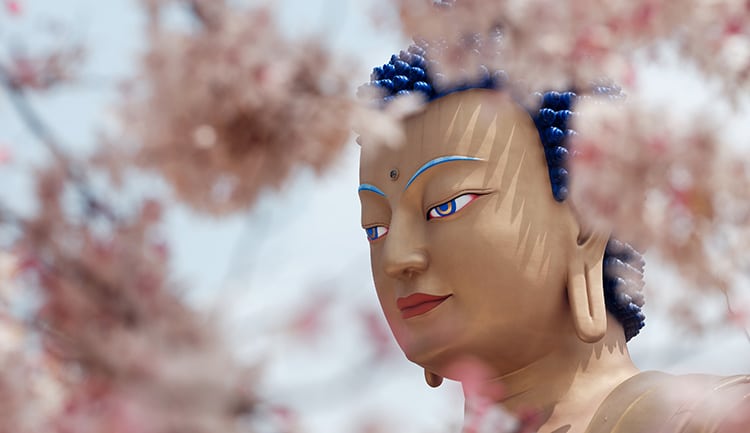What Is Dependent Origination?
Category: Buddhist Path

What Is Dependent Origination? (Dependent Arising & Interdependence)
The Buddha, once a dissatisfied human just like us, is praised as an awakened one. But what did he awaken to? At times, the Buddha described his enlightenment as awakening to the 12 links of dependent origination. With profound clarity, he realized the structure behind the self-perpetuating cycle of mistaken perception, thus freeing himself from its habitual turning.
We too, can move toward freedom by studying how it is that we perceive the world in our un-enlightened state. Understanding the mechanism behind our misperception enlightens us to how we might see things differently, and thus suffer less.
Dependent Origination Explained
Dependent origination (Sanskrit: Pratītyasamutpāda) in Buddhism is a means of making sense of how we perceive the world. In our unawakened state, our experience of ourselves and others is conditioned. Each moment of consciousness depends on our past conditioning. How we label and react to each moment then colors our experience of the next, and so on. This self-perpetuating cycle is also known as samsara because it perpetuates suffering.
The teaching on the Four Noble Truths, in particular the 2nd of these truths, reminds us that our suffering has a cause. At the root of suffering we find ignorance, the great misunderstanding about where happiness comes from. But what is at the root of ignorance?
The 12 links of dependent origination describe the cyclical relationship between ignorance and suffering. To become aware of this self-perpetuating habit loop is the first step in becoming empowered to break it.
The 12 Links Of Dependent Origination
The 12 links are presented linearly but represent an interdependent cycle. Although ignorance is marked as number one, there is no first link that arises out of nowhere. Ignorance is caused and is a result of the previous links, as are all the rest.
The first three links describe the momentum with which we are born into samsara. They may be referred to collectively as impelling links or as defilements. Unlike the concept of original sin, however, these three are not representative of our true nature.
- Ignorance: Perhaps more accurately described as naivety or unawareness, ignorance is at the root of our misunderstandings regarding how we exist, what genuine happiness is, and what causes it.
- Formations: Ignorance drives us to think, act and speak in ways that create karma. Negative, positive or neutral karma compels us to take birth in one of the 6 realms.
- Consciousness: Karmic formations cause the consciousness of our next existence. This consciousness then perpetuates our karma.
- Name and Form: Name and form represents the development of the five aggregates. Due to ignorance, we mistakenly identify with the aggregates as a solid, independent self.
- The Six Senses: Depending on the name and form we are compelled to cling to, six sense sources of eyes, ears, nose, tongue, body and mind arise.
- Contact: Contact occurs as a sense organ meets an object of the senses. As an eye sees, or a nose smells, for example.
- Feeling Tone: The instant the senses make contact with an object, feeling tone arises. Contact gets labeled as pleasant, unpleasant or neutral.
- Craving: In a reaction to the feeling tone experienced, we either crave for more or crave for it to end.
- Clinging: Craving further strengthens into grasping. We cling to what is pleasant while avoiding what is unpleasant. We also grasp to the idea of a stand-alone, independent self.
- Becoming: This is a moment of action in body, speech or mind. Due to clinging, we are driven to act habitually, creating the karma that gives rise to our existence in samsara.
- Birth: This is the moment of conception. Consciousness has propelled us to enter a womb where we will develop the five aggregates, sense consciousness, and so on.
- Old Age and Death: Aging follows the moment of conception. It is the continual process of change that occurs, even as the aggregates develop. Death can occur at any time, and so is grouped together with aging.
Breaking the 12 Links
Dependent origination can be a challenging Buddhist concept to understand. To contemplate the meaning of dependent origination, however, is to begin to soften our tight hold on an independently existing, and suffering, self.
According to the Buddha, to be free from conditional happiness, a happiness that’s dependent on things being a certain way, we must understand the law of cause and effect. Both the Four Noble Truths and dependent origination are a means of describing what causes us to cling to conditional, and ultimately unsatisfactory, happiness.
The law of dependent origination is thus significant not only as a description of psychology or a particular worldview, but as a tool that can help free us from suffering. One who understands the 12 links accepts that things don’t happen randomly. Our pain and suffering are caused, meaning we can put an end to them by no longer participating in the causes.
To step out of habitual cycles of self-harm, we meditate, act with kindness, and work toward a deepening wisdom. This wisdom, or prajna in Sanskrit, is the main goal of the Buddhist path, as it is the faculty that penetrates dependent origination. As we gain more of an experiential understanding of what we are not, we catch glimpses of our true essence – the fact of our inherent Buddha nature. If we can rest in this true nature, the ignorance, craving and reactivity that gives rise to perpetual suffering will gradually come to an end.








